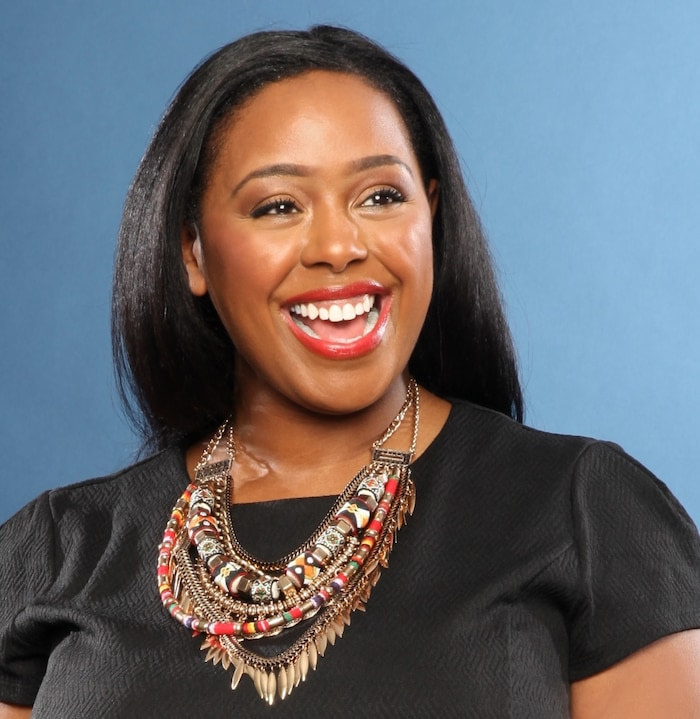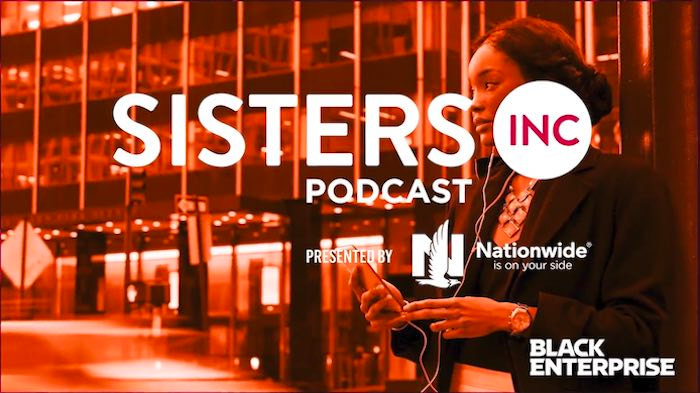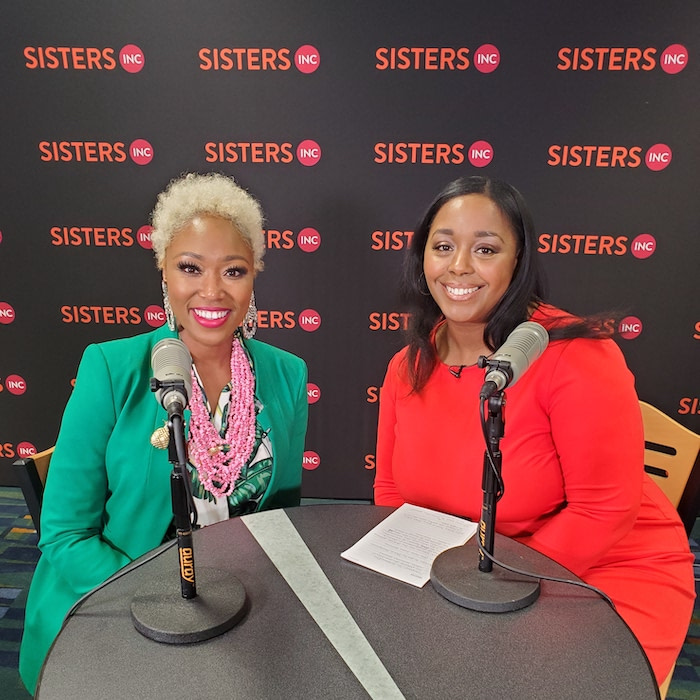SistersInc’s Alisa Gumbs on the power of black women in business
We met Alisa to talk about building your business as a black woman and the importance of community.

Stories are what motivate Alisa Gumbs. The journalist, podcast host and executive managing editor of media firm Black Enterprise relishes in uncovering how and why the most inspiring narratives come to life. That’s why she launched SistersInc, an award-winning podcast series shedding light on black women in business, one CEO at a time.
We met with Alisa to discuss building your business as a black woman, the importance of community and how to find more meaningful success.
The voice behind SistersInc is nothing if not driven. Her fascination with the media started early. “I consider myself one of the fortunate people who has always known what I wanted to do. I just love the idea that the media really sets the agenda. Back when I was sixteen, it determined what people talked about at the dinner table. Now, they determine what people talk about in their group chats! That power was really an amazing lure for me from the beginning.”
She went on to study broadcast journalism “with the intention of being the next Katie Couric” (she smiles) before realizing magazines would be a better fit for her storytelling talents. That’s when she joined Black Enterprise, a media firm dedicated to educating and empowering the black community in the fields of business and wealth building.
“I realized that the work we do really changes people’s lives”
Working for Black Enterprise, Alisa fell in love with its mission statement. “I realized that the work we do really changes people’s lives – whether it’s progressing in their career, growing their businesses or figuring out their finances. That’s a calling that I’ve been wholeheartedly invested in for the past (almost) two decades as a business journalist. That’s where that passion came from.”
Putting women in the spotlight
SistersInc. came to life in January 2020 – a few months before the words “pandemic” and “lockdown” became staples of our everyday conversations. The idea sparked from an observation: black women were the fastest-growing group of entrepreneurs in America. A growth they had witnessed first-hand in their various business events.
“Black Enterprise has an event called our Entrepreneurs Summit that we’ve been doing for the past (almost) thirty years. It’s one of the largest gatherings of entrepreneurs of color in the US. Way back in the day, the women there told us that they wanted something that was just for them. There used to be a golf outing. The men would go golfing and the women would say ‘ok, so what are we going to do? Can we have something just for us?’”
“Over the past few years, we also noticed the demographics changing among the people who come to the event, and amongst black entrepreneurs in general; many more women were starting and running businesses.” And thus SistersInc was born. First, as sessions from the Entrepreneurs Summit and the Women of Power Summit. Later, these inspiring conversations turned into a podcast.
“Each episode has a theme in which we get into the specific nuts and bolts of business. But we like to tell their own stories too because they’re also unique.” Unique like Olamide Olowe, the youngest black woman to raise $1 million, having raised $2.6 million for her skincare startup Topicals. Or like wealth justice activist Chloe B. McKenzie, who founded BlackFem, a company that aims to help close the racial and gender wealth gap.
Of these inspiring stories, La Niecia’ Vicknair’s vision really stuck with Alisa. The founder of fitness studio Thrive Health Lab started her business after her father passed away. “I take a little bit away from all of them. But La Niecia’ Vicknair’s story was so touching to me because she lost her father to a heart attack as a result of his obesity. She used the inheritance to open up this gym that advocates health in the community, so that nobody else would have to lose a family member from a preventable disease. It’s not just the passion that she had – being a fitness instructor – but also turning all of that really into honoring the legacy of her father and serving her purpose in the community.”
“These people could have done anything with their lives; why is it that they’re doing this particular thing?”
Alisa’s love of storytelling seeps into every episode. What she’s looking for is that drive, that passion that pushed her interviewees to take the leap. “So many stories of American entrepreneurs are passionate stories. I like to start each episode with what I call the founder’s story to get to who they really are on the inside and how they came to do whatever they’re doing.
“To me, that’s always the most interesting part. It’s where you hear their passion, it’s where you get their purpose. It’s where there’s an emotional hook for me. These people could have done anything with their lives; why is it that they’re doing this particular thing?”
“We’re built for this”
Why, indeed? Pre-pandemic, black women were the fastest-growing group of entrepreneurs in America. When asked what draws them to entrepreneurship, Alisa cites two complementary forces. “I think that we’ve got both a push and a pull going on. There’s a push out of corporate America for many black women. In every workplace, there’s a lot of bias, discrimination or microaggressions. There’s the glass ceiling that they’re butting up against, and they’re not advancing the way they want to in their career. A lot of them are leaving and choosing entrepreneurship because of that.
“Then there’s also a pull to entrepreneurship. Everyone can understand wanting to be your own boss. And for black women in particular, I think there’s a desire to take care of their families, a desire to take care of their communities that they’re able to do as entrepreneurs, and they’re really well suited for it. Because historically, we’ve always had to be resourceful and resilient. And as one of our podcast guests said, ‘we’re built for this’. So they’re finding success at it as well.”
Alisa meets these kinds of successful women twice a month, as part of her podcast. . Beyond demographics, what they have in common is a solution-oriented mindset. “They are problem solvers. So many of the stories are about them filling a need that they saw in their own life. For instance, Denise Woodard, the CEO of Partake Foods – which is now a huge company that’s in major supermarkets and retailers across the country – started her allergy-friendly snacks business because her kid has food allergies. She couldn’t find anything to give to her kid that was safe for them to eat, but also tasted good and had some kind of ‘cool factor’.
“That’s the thing that comes up over and over again. These women didn’t just set out and say, ‘ I’ve got this idea in my head and I must bring it into the world’, which I hear a lot with male entrepreneurs. With black women, it’s often ‘necessity was the mother of invention’. ‘I had this problem. I didn’t want to be an entrepreneur, I didn’t want to be the person who had to solve the problem, but nobody else was doing it and I needed it done. So here I am, doing it’. They became ‘accidental entrepreneurs’ in that sense.”
Empowering the community
To Alisa, black women in business are driven with purpose and create greater value in the community. . “At the height of the pandemic, the one thing that they all said to me without fail was that they were keeping each other afloat. They were reaching out to each other to find information about grant money or PPP (Paycheck Protection Program) money. Sometimes this was formal networking, but there were also social media groups for business, local chambers of commerce, or cohorts from accelerator programmes that they had been through.
“And sometimes it was the informal networks that they had – whether they were connecting with other black women entrepreneurs from their churches or from their sororities or wherever they found them. Their attitude was ‘we don’t know what’s going on and the only place that we feel like we’re getting help from is each other’.”
This sense of network and community is essential to thriving as a business – especially when you don’t get access to the same opportunities. “As black people, we often say that we don’t have the luxury of failure, we don’t get to take the same risks that other people get. Because if we get an investment, and the return is not there, we’re not getting a second chance.
“Maybe the next black entrepreneur isn’t going to get their first chance at that investment, because we didn’t deliver on ours. The ability to do the kinds of trial and error that are necessary as an entrepreneur is not always there. So learning from each other to get there faster, with fewer mistakes, and taking fewer unproven steps, is something that’s been really important for black women entrepreneurs and part of why they rely on each other.”
With SistersInc, Alisa is empowering black women entrepreneurs by shedding light on the journey of successful CEOs. Reflecting the mission of Black Enterprise, she believes in leading by example. “[It’s great] to know that you don’t have to feel stuck where you are; you can decide on any day that you want something different. And there’s a path for you because others have successfully tried before.”
While inspiring others is important, giving them the tools to get started is also essential. “It helps the entire black population when you have a strong business community and you shine a spotlight on successful entrepreneurs. It tells all the up-and-coming or aspiring entrepreneurs that they can do it too – but also how they can do it. My first editor in chief at Black Enterprise used to say that if we’re not saying how to, we’re not doing our job right. The spotlight is important for the narrative, but we also need to use these stories to educate and inform.”
“[Black women] feel tasked to get their foot in the door, but also open it wider for others”
Fortunately, successful entrepreneurs on Black Enterprise are always willing to share their advice – and even their contact. “They are so open to mentoring younger entrepreneurs and sharing their missteps so that other people can avoid them. I think there is a misconception about women in general, that we’re competitive or that we’re catty. Especially when it comes to black women and what you see on television, on reality TV it looks like we’re always at each other’s throats. It is not at all the reality that I have experienced – it’s actually just the opposite. They really feel like there’s room for all of us at the table. And they feel tasked to get their foot in the door, but also open it wider for others to come behind them.”
Start lean, stay real
One of the best pieces of advice Alisa received is from finance expert Tiffany Aliche, founder of The Budgetnista. “Start lean. When people, and women in particular, want to start a business, they tend to wait until they feel ready, all of their i’s are dotted, all of their ducks are in a row. If you want to start a business selling cookies, to start with, you only need to spend your money on ingredients. Apron, menu board… all that stuff will come later once you expand.”
Authenticity was another point that stood out in her conversations with entrepreneurs. “At our Women of Power Summit, I had the privilege of interviewing the CEO of Essence magazine, Caroline Wanga. She used to be a Chief Diversity Officer. And she was talking about how she was tasked with telling people to show up as their authentic selves and bring their whole selves to work. And she realized she wasn’t doing it herself. She said ‘I was wearing cardigans and khakis when I’m not really a cardigan and khaki girl’. If you could have seen her on stage, she was wearing an electric blue fedora and six-inch platform boots.
“A lot of women, and especially black women spend so much time trying to be the kind of CEOs that they’ve seen before – mostly white men – or the ones they think they should be or that other people expect them to be. So much mental and emotional energy goes into maintaining that mask. When you free yourself of that, you really free up all of this creativity and space to really run your business the way you want – whether that’s how you dress, how you interact with your staff, or anything about your business. The entrepreneurs I have spoken to really hit their stride when they learned to be comfortable with who they are, and their own style of being a small business owner – and not what anyone else was expecting of them.”
This authenticity can be a starting point to redefine work culture through a feminine lens. “When it comes to what women bring to business, empathy is the first thing that comes to mind. It has not been the prevailing culture for a long time, but it’s common sense, especially in the midst of what we’ve been through for the past few years. When I’m talking to women entrepreneurs, we’re talking about giving ourselves and each other grace.
“We’re working on top of all of these challenges. We were concerned about our health and our loved ones and losing people, especially as black people in America were disproportionately affected by and disproportionately died from COVID-19. And then George Floyd and all of the things that came after that. I’d see my editors crying as they were just doing their jobs because they’re having to watch videos of police brutality for work. As a leader, you have to think ‘how can I make their work experience a good one and a healthy one and a pleasant one? How can I keep them engaged and keep their morale high?’
“I think women are just more intuitive about that or have been socialized to be. It’s ok to care. Talk about things, ask how people are doing, and try to find solutions. Don’t just say ‘that’s their personal problem’. In terms of women’s leadership, I think that empathy is something that hopefully will transform and become part of overall work culture.”
Listen – and watch – SistersInc. here and follow Alisa Gumbs on Twitter here.
Keep in touch
Get design inspiration, business tips and special offers straight to your inbox with our MOOsletter, out every two weeks.







